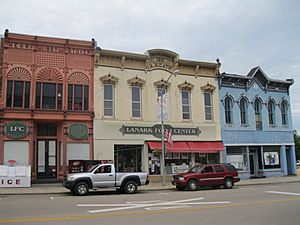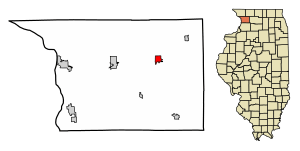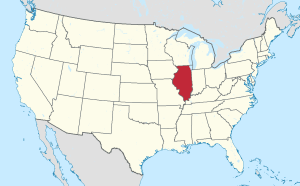Lanark, Illinois facts for kids
Quick facts for kids
Lanark
|
|
|---|---|
| The City of Lanark | |

Historic commercial buildings in Lanark's business district
|
|
| Nickname(s):
Tree City U.S.A.
|
|

Location of Lanark in Carroll County, Illinois.
|
|

Location of Illinois in the United States
|
|
| Country | United States |
| State | Illinois |
| County | Carroll |
| Founded | 1861 |
| Government | |
| • Type | Mayor-Council |
| Area | |
| • Total | 1.12 sq mi (2.90 km2) |
| • Land | 1.12 sq mi (2.90 km2) |
| • Water | 0.00 sq mi (0.00 km2) |
| Elevation | 879 ft (268 m) |
| Population
(2020)
|
|
| • Total | 1,504 |
| • Density | 1,341.66/sq mi (518.21/km2) |
| Time zone | UTC-6 (CST) |
| • Summer (DST) | UTC-5 (CDT) |
| ZIP Code(s) |
61046
|
| Area code(s) | 815 |
| FIPS code | 17-41859 |
| Website | http://www.lanarkil.com/ |
Lanark is a small city in Carroll County, Illinois, United States. It was named after a town called Lanark in Scotland. In 2020, about 1,504 people lived there.
Contents
History of Lanark
Lanark was founded in 1861 by Daniel W. Dame. He bought about 500 acres of land and planned out the city. He was also elected as the first mayor.
In 1886, 40 people each gave one dollar to start a public library. This shows how much the community valued reading and learning.
A primary and secondary school was finished in August 1871. Sadly, the original school building was destroyed by fire in November 1893.
Early in the 1900s, Lanark was home to the Cotta company. This company made special cars that ran on steam!
School Changes in Lanark
In 1986, Lanark High School joined with Shannon High School to create the Eastland School District. At first, the high school and grade school were in Lanark, and the middle school was in Shannon.
After the 2012–2013 school year, some changes happened. The elementary school in Lanark closed, and those students moved to the Shannon building. The middle school students then moved to the high school building in Lanark. This building is now called Eastland Jr./Sr. High School.
People of Lanark (Demographics)
| Historical population | |||
|---|---|---|---|
| Census | Pop. | %± | |
| 1870 | 972 | — | |
| 1880 | 1,198 | 23.3% | |
| 1890 | 1,295 | 8.1% | |
| 1900 | 1,306 | 0.8% | |
| 1910 | 1,175 | −10.0% | |
| 1920 | 1,297 | 10.4% | |
| 1930 | 1,208 | −6.9% | |
| 1940 | 1,292 | 7.0% | |
| 1950 | 1,359 | 5.2% | |
| 1960 | 1,473 | 8.4% | |
| 1970 | 1,495 | 1.5% | |
| 1980 | 1,483 | −0.8% | |
| 1990 | 1,382 | −6.8% | |
| 2000 | 1,584 | 14.6% | |
| 2010 | 1,457 | −8.0% | |
| 2020 | 1,504 | 3.2% | |
| U.S. Decennial Census | |||
In 2020, there were 1,504 people living in Lanark. There were 617 households, which are groups of people living together.
About 22.4% of the people in Lanark were under 18 years old. This means there are many young people and families in the city. The average age of people in Lanark was about 43.9 years old.
Geography and Climate
Lanark is located in Illinois at coordinates 42.101346 degrees North and -89.832120 degrees West. The city covers a total area of about 1.12 square miles (2.90 square kilometers), and all of it is land.
Lanark's Weather
Lanark experiences different seasons throughout the year. Summers are warm, with average high temperatures around 29 degrees Celsius (84 degrees Fahrenheit) in July. Winters are cold, with average low temperatures around -14 degrees Celsius (7 degrees Fahrenheit) in January. The city gets a good amount of rain, especially in spring and summer.
| Climate data for Lanark, Illinois | |||||||||||||
|---|---|---|---|---|---|---|---|---|---|---|---|---|---|
| Month | Jan | Feb | Mar | Apr | May | Jun | Jul | Aug | Sep | Oct | Nov | Dec | Year |
| Mean daily maximum °F (°C) | 28 (−2) |
36 (2) |
46 (8) |
61 (16) |
72 (22) |
82 (28) |
84 (29) |
82 (28) |
75 (24) |
64 (18) |
46 (8) |
34 (1) |
59 (15) |
| Mean daily minimum °F (°C) | 7 (−14) |
12 (−11) |
25 (−4) |
36 (2) |
46 (8) |
54 (12) |
59 (15) |
55 (13) |
46 (8) |
36 (2) |
27 (−3) |
14 (−10) |
35 (2) |
| Average precipitation inches (mm) | 1.43 (36.3) |
1.52 (38.6) |
2.63 (66.8) |
3.67 (93.2) |
4.34 (110.2) |
4.77 (121.2) |
3.83 (97.3) |
4.54 (115.3) |
3.48 (88.4) |
2.73 (69.3) |
2.84 (72.1) |
2.02 (51.3) |
37.8 (960) |
| Source: weather.com | |||||||||||||
Education in Lanark
Lanark is part of the Eastland Community Unit School District #308. This school district also includes the nearby towns of Shannon and Lake Carroll.
The students in this district are known as the Eastland Cougars! Eastland Elementary School is located in Shannon. Eastland Jr./Sr. High School, which serves both middle and high school students, is located right here in Lanark.
See also
 In Spanish: Lanark (Illinois) para niños
In Spanish: Lanark (Illinois) para niños

